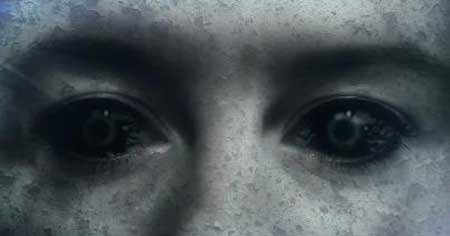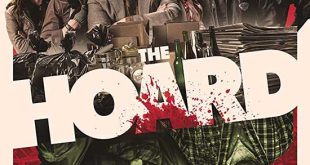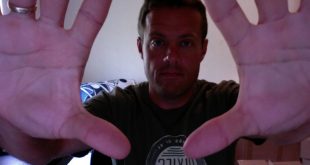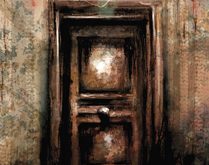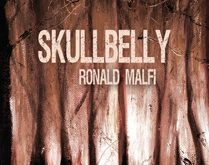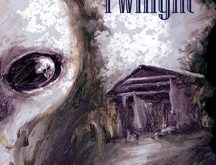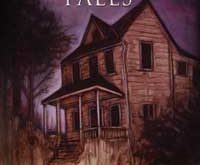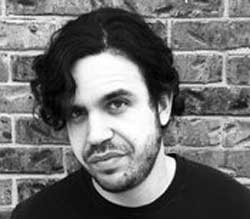 “Hoarders, Old-School Vampires, and Zombie Horses”
“Hoarders, Old-School Vampires, and Zombie Horses”
“The Hoard” is a truly original concept and I think many readers are going to agree. Can you tell us a little bit about the book and how it came to be?
The Hoard is about a stubborn old hoarder who wants to be left in peace, against the wishes of her adult son. What the characters don’t realize is that intertwined with their drama is a dangerous, unseen threat: a newly evolved creature that has crept out of the drought-blasted Kansas prairie and into their lives.
The story’s origin is typical for me, in that it materialized when I needed it. I’m not an idea person. A lot of writers talk about their many notebooks overflowing with ideas for stories they’ll never live long enough to tell. That’s not me. I don’t have ideas out of the blue. My ideas come to me when I put my fingers to the keyboard. I think that’s a good thing, in some ways, because I don’t get focused on concept over character. The bad aspect of this condition is that it took a long time for me to trust that I’ll always have something to write about when confronted with that intimidating blank page.
Anyway, Greg Gifune contacted me and asked if I had a novel in the works that might be a good fit for DarkFuse. Unfortunately, I’d pretty much finished off all of my horror fiction projects, and was still feeling around for what I wanted to do next. In other words, no, I had nothing in the works, and no, I had no ideas to pitch. Of course I didn’t actually say that.
A new season of Hoarders had recently been added to Netflix Instant, and I’d been watching it obsessively. Having anxiety problems of my own, I find shows like that really compelling, like I can get a sympathetic dopamine bump. I joked to my wife that I should write a book about Hoarders. Within an hour I had the whole concept.
The specific episode that inspired The Hoard is particularly horrific. The hoarder walks around her house barefoot, over trash infested with bugs that bite her feet, leaving open wounds. The wounds then get infected, as they’re constantly awash in trash juice. If I remember correctly, they thought there was a chance they might actually have to amputate.
In addition to tackling hoarders and parasitic infestations, your previous novels Burden, Kansas and the follow-up Blood Tells True, present vampires are nasty, savage, bloodthirsty killers, not the clean-cut, aristocratic types indicative of today’s mainstream portrayals. How difficult was it for you to take a standard horror literature trope and make it your own in such an original way?
If your aim is to do something original, I don’t think it’s very difficult. You just can’t be too tied to tradition. I feel no loyalty towards any tradition. Actually, that’s not entirely true. When DC approaches me to write a Batman story, I will work very hard to honor what I believe to be the essence of Batman. But until that fateful day, I’ll always be faithful to the needs of the story over tradition. Some vampire conservatives have said that most of my vampires act like zombies, except the ones who act like tweakers. Some say that besides not behaving like vampires, their condition having a microbial origin means that they aren’t vampires at all. Fine. They aren’t vampires. I don’t care. They are what I needed them to be to tell the story I wanted to tell, whatever label you put on them. It’s crazy that if a person mentions 28 Days Later in a list of zombie flicks, they still have to include the qualifier “I know they weren’t really zombies” in order to avoid an argument.
That sounds very pure, so I feel the need to confess that the seed of my Vampires of the Plains series was a short story written several years ago as a response to a popular vampire series that need not be named. Spite can be a good motivation.
But the fun of seeing what mileage you can get out of a tired trope is also good motivation. And sometimes if you beat a dead horse hard enough, it will rise up and shamble along a few more steps. Zombie horse!
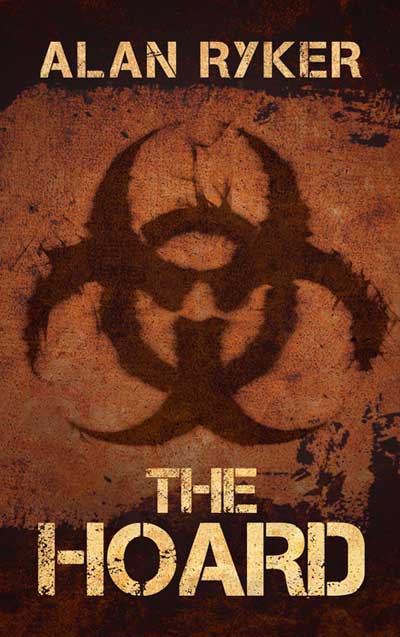 How much inspiration do you draw from your locale in the Midwest?
How much inspiration do you draw from your locale in the Midwest?
Kansas is an intense place, with a lot of extremes. Usually a place with hot summers has mild winters and vice versa. Kansas can kill you with its summer and its winter, and the milder seasons tend to be short if they happen at all.
Take politics and religion. Kansas originated as a free state because people who believed humans shouldn’t be enslaved moved here in droves to make sure it entered into the Union on the right side. And yet the Kansas State Board of Education made us a laughing stock when they wanted to teach creationism in schools. Topeka is home to the Westboro Baptist Church, but also a huge mural of my personal hero, John Brown.
There are all these small towns full of people trying to maintain a fading way of life. These farming towns built along railroads once had motels, movie theaters and restaurants. The trains stopped coming, and now Main Street is a row of abandoned, collapsing buildings. And of course as the agricorps grow ever larger, they become impossible to compete with and the young abandon family farms and move to the city where they can get jobs, and so on and so on…
When I was a kid, I swore I’d leave Kansas and never come back. I left for a while, but the place never left me. Kansas and its people found their way into my writing. I did come back, and I don’t know if I’ll ever leave.
However, I have to admit that I now live in the Kansas City area. I grew up so far out in the sticks that the school bus route didn’t extend to my house. That won’t be happening again. I have a real appreciation for public utilities.
Stephen King once said that many of his stories didn’t start out as horror novels, rather with the premise, “Wouldn’t it be funny if…” Do you always set out to write darker fiction or does it just happen that way?
I write in a number of different genres, and yet whatever the category they most neatly fit in, they’re almost all horror at their rotten core. Even those without monsters and murderers are about the anxiety of the modern condition.
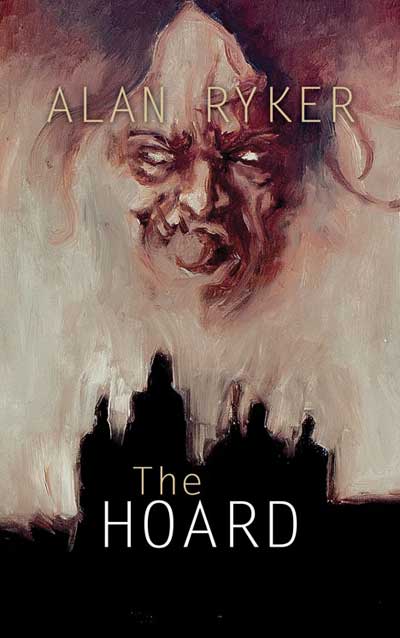 Funny enough, it’s most often when I start with a clichéd horror trope that I can veer the story off into an exploration of lighter themes. My Cthulhu mythos play has all the Lovecraftian trappings, and yet is the most heartwarming thing I’ve ever written.
Funny enough, it’s most often when I start with a clichéd horror trope that I can veer the story off into an exploration of lighter themes. My Cthulhu mythos play has all the Lovecraftian trappings, and yet is the most heartwarming thing I’ve ever written.
Who are some of your favorite writers?
One of the best things about working with DarkFuse is that I get to see my work beside the work of some of my favorite horror authors, like James A. Moore, Jeff Strand and Greg Gifune. Thomas Ligotti is probably my all-time horror favorite. I’ve recently been devouring everything by Andersen Prunty, who writes some brilliant horror / bizzaro / transgressive stuff.
Even though I read a lot, I tend to read widely instead of deeply, so it’s easier for me to talk about favorite books than favorite writers. Some of the books I’ve read in the past year or so that have really impressed me are The Swerve by Stephen Greenblatt, The Shelter by James Everington, The Day of the Locust by Nathaniel West, Fill the Grand Canyon and Live Forever by Andersen Prunty, Room by Emma Donoghue, Never Let Me Go by Kazuo Ishiguro, Lunar Park by Bret Easton Ellis, and The Lost Books of the Odyssey by Zachary Mason.
What can we look forward to reading from you in the near future?
I think I’m going to write a haunted house story or two.
Alan Ryker is the product of a good, clean country upbringing. Though he now lives with his wife in the suburbs of Kansas City, the sun-bleached prairie still haunts his fiction. Visit him on the Web at www.alanryker.com.
Alan’s first featured DarkFuse novel The Hoard is now available at: http://www.amazon.com/gp/product/B009Z3R6TG/
 Horror News | HNN Official Site | Horror Movies,Trailers, Reviews
Horror News | HNN Official Site | Horror Movies,Trailers, Reviews
